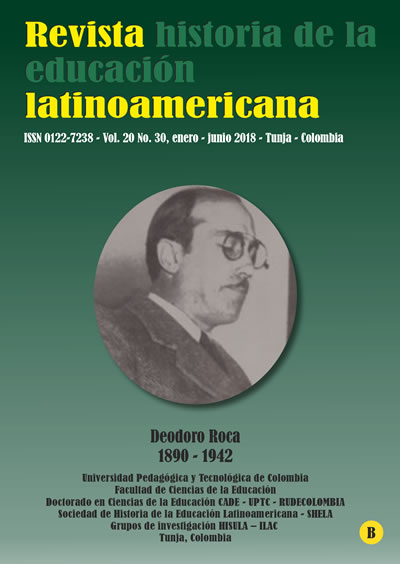Manifiesto Liminar celebrates a century: political action and rebellion in defense of the Colombian University

Abstract
The objective of this reflection article is to analyze the impact that the Manifesto Liminar has on the political and social actions of the university movements in Colombia. University students’ speech propose rebellion as the agglutinating spirit that justifies their collective actions; this vision, shared by the youth of Córdoba, strongly suggest a connection between both movements. This article is derived from a research project that uses a qualitative methodology with an interpretive approach. Primary sources such as the press with semi-structured interviews and historiographic balances are triangulated. Finally, it is stated that the "identity" generated in the midst of rebellion and collective actions in the 1960s and 1970s underwent a transformation in the 1980s to reach the peak of its languor, when the same speech of revolution is adapted by the system during the neoliberal reforms.Keywords
Journal History of Latin American Education; academic autonomy; student movement; Education reform, University
Author Biography
Álvaro Acevedo Tarazona
Posdoctorado en Ciencias de la Educación. Profesor Titular Universidad Industrial de Santander. Director del Grupo de Investigación Políticas, Sociabilidades y Representaciones Histórico-Educativas.
Andrés David Correa Lugos
Historiador y Archivista. Miembro del Grupo de Investigación Políticas, Sociabilidades y Representaciones Histórico-Educativas.
References
- FUENTES
- Archivo Memoria y Palabra, Bogotá, 2017.
- Entrevista a Actor Clave 2, Bucaramanga, 2017.
- Entrevista a Actor Clave 4, Bogotá, 2017.
- El Tiempo, Bogotá, 1993.
- REFERENCIAS
- Acevedo, Álvaro. 1968. Historia de un acontecimiento: utopía y revolución en la universidad colombiana. Bucaramanga: UIS, 2017.
- Biagini, Hugo. “La cultura de la resistencia juvenil y el proceso emancipador”. Revista de Historia de la Educación Latinoamericana No. 11 (2008): 59-76. DOI: https://doi.org/10.19053/01227238.1498
- Gasper, Phill. “Marxismo y ciencia”. Socialist Workers Party 79 (1998).
- Gaviría, César. La revolución pacífica. Bogotá: Presidencia de la República, 1991.
- Guattari, Félix y Rolnik, Suely. Micropolítica: cartrografías del deseo. Madrid: Traficantes de Sueños, 2006.
- Han, Byung-Chul. Topología de la violencia. Madrid : Herder, 2016.
- Le Bon, Jacques. Psicología de las masas. Madrid: Morata, 1995.
- Medina, Medófilo. “El neoliberalismo en Colombia y las alternativas de las luchas sociales 1975-1998”. En Lucha popular, democracia y neoliberalismo editado por Margarita López Maya. Caracas: Nueva Sociedad, 1998, 152-178.
- Melucci, Alberto. “La acción colectiva como constructo social”. Estudios Sociológicos IX, no. 26 (1991). DOI: https://doi.org/10.24201/es.1991v9n26.911
- Memoria y Palabra, 16 de mayo de 1984: 28 años de silencio. Bogotá: 2012
- http://memoriaypalabra.blogspot.com.co/2012/05/16-de-mayo-del-84-28-anos-de-silencio.html (31 de diciembre de 2017).
- Negri, Antonio. Fin del invierno. Buenos Aires: La Isla de la Luna, 2008.
- Oberg, James. Final frontier. New York: Grolier, 1992.
- Rébora, Luis Armando. La reforma universitaria 1918-1988. Buenos Aires: Legasa, 1989.
Downloads
Download data is not yet available.
